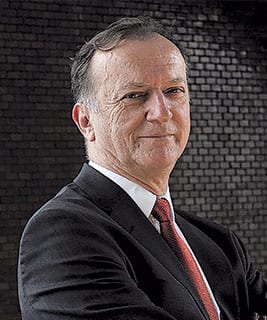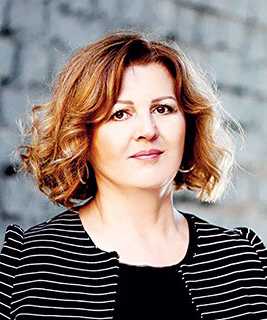No one is at ease with the outcome of May’s European Parliament elections. It seems obvious that existing political structures are to be dissolved and new political alliances forged, yet the extent to which the outcome will change how the EU functions is unclear, as is whether the Western Balkan enlargement process will remain firmly on the agenda
Indeed, the latest elections for the European Parliament were, and will certainly continue to be, one of the events most commented on globally, as they could potentially have a profound impact on the EU’s future. In the shadow of this huge question lies one that is important to Western Balkan leaders – how the outcome of the elections will influence the idea of enlargement, and in particular the dialogue between Belgrade and Pristina. While most of the answers to this question are connected to the political choices of EU voters, some of CorD’s interlocutors highlight the importance of the attitudes of Western Balkan leaders.
 Duško Lopandić
Duško Lopandić
Ambassador, Ministry of Foreign Affairs
The Goal Remains, But The Tempo Might Be Affected
The issue of enlargement shows the capacity and vitality of EU policies. However, the general outcome of the elections will have an impact on the willingness of future decision-makers in the EU to pursue a vigorous EU reform agenda, including the policy of enlargement to the Western Balkans, as one of the strategic objectives
European Parliament elections are politically more important than ever, as they will have a real impact on the general atmosphere among EU Member States, and the future choices that will be made concerning the election of the president of the European Council and the European Commission, including the High Representative for Foreign and Security Policy etc., as well as for future EU policies. The EU is at today at a crossroads – and there is a kind of paradox. According to polls, two-thirds of citizens in EU countries support European integration, yet a majority of them believe that the EU may somehow disintegrate in the not-too-distant future.
I believe that the next majority in the European Parliament – to include the EPP, SD, liberals, greens, left etc. – will continue to support the EU Enlargement policy. As far as parties from populist or Eurosceptic groups are concerned, they do not have a unanimous position on the issue of Enlargement. As such, I think the impact of European Parliament elections on the Enlargement policy will be more indirect, connected with the general outcome of elections and the willingness of future decision-makers in the EU to pursue a vigorous EU reform agenda, which should comprise enlargement to encompass the Western Balkans as one of its strategic objectives.
I believe that serbia will continue to pursue its european path, including reforms and accession negotiations with the eu, as a strategic objective to which there is no alternative
As we know, the last EU summit, held in Sibiu this May, which dealt with strategic choices for the EU in the 2019-2024 period, did not mention enlargement. However, I don’t think that enlargement issues will disappear from the EU agenda in the period ahead. The completion of the EU Enlargement process will be of paramount importance to European stability, security and general prosperity, as the Western Balkans is in the EU’s backyard and is important for the Union.
The credibility of the EU and its capacity to continue projecting its transformative power is at stake. If the EU is unable or unwilling to exercise its impact and fully integrate the Western Balkans, what impact will it be able to have on the rest of the world? More then with the Western Balkans, the issue of enlargement demonstrates the capacity and vitality of EU policies.
I also believe that Serbia will continue to pursue its European path, including reforms and accession negotiations with the EU, as a strategic objective to which there is no alternative. The future European Parliament majority and new European Commission should reconfirm and support policies that will accelerate accession talks for Serbia, in order to complete the accession process in a 2025 perspective.

Florian Bieber
Professor of Southeast European History and Politics, and Director of the Centre For SE Studies at The University of Graz
Nothing Will Stay The Same
The traditional “grand coalition” of social-democrats and conservatives is unlikely to retain control after the elections, which might result in a three-way coalition to include liberal parties, including macron’s party. This would mean more emphasis on the rule of law and a possible rethink of the current enlargement process
The European Parliament elections will be important in shaping future EU policy, and thus also the region. While there has been a rise in populist parties in the EU over recent years, it is unlikely that the EP will shift to the far right. This is mostly due to the fact that, already in 2014, at the last elections, the far right did well, mostly because citizens used European Parliament elections as a way of voting to punish their elites and established parties. Thus, the centre is likely to remain strong and dominant. An increase for far-right and populist parties would run the risk of mainstream parties adopting parts of the populist agenda. Most far right parties and populists are anti-enlargement and, thus, an increase of their vote, especially in countries like France and Germany, is likely to be negative for enlargement. The traditional “grand coalition” of the Social-Democrats and Conservatives is unlikely to retain control, which might result in a three-way coalition to include liberal parties, including Macron’s party.
A key issue for serbia and the Western Balkans will be the identity of the new high representative of the European Union for foreign affairs and security policy, which is crucial in terms of the future dialogue between Serbia and Kosovo
This would mean more emphasis on the rule of law and a possible rethink of the current enlargement process. Furthermore, the new European Commission will look very different to the current one with new members, and a key issue for Serbia and the Western Balkans will be the identity of the new High Representative of the European Union for Foreign Affairs and Security Policy, which is crucial in terms of the future dialogue between Serbia and Kosovo, while another important appointment will be that of the new enlargement commissioner. We can’t be sure that the new commissioner will retain this portfolio as the main one, or whether it might be combined with other portfolios. Furthermore, another worry is that it could be a weak commissioner from a member state that is problematic in terms of the rule of law, and might thus undermine enlargement in practice.
 Srđan Majstorović
Srđan Majstorović
Chairman of the Governing Board, European Policy Centre – CEP
Enlargement Takes Two
Both the changes in the political landscape following the European Parliament election and the way Western Balkan leaders respond to these changes might have a strong impact on future outcomes of the enlargement process. A possible lose-lose scenario should be avoided
Two factors are going to be important when assessing the influence of European Parliament elections on the EU’s Enlargement Policy and the Western Balkans’ EU integration path. The first is the look of the political landscape after European Parliament elections. It is obvious that two major traditional political groupings, EPP and S&D, will lose a substantive part of their public support. They will lose the majority they traditionally had in the Parliament. The big winners will be populist rightwing parties, but also ALDE, together with Macron’s En Marche and the Greens. The new political landscape of the European Parliament will be more fragmented. It will be more difficult to achieve a majority and easier for the minority to obstruct the decision-making process. The rise of populist parties will certainly influence the dynamics of the EU Enlargement process. The atmosphere might influence the EU’s strategic orientation, the legislative process and different policies. Parties that are demanding the “return of national sovereignty” are not going to be keen on sharing sovereignty with newcomers. The European Parliament’s role in approving a candidate for the position of President of the European Commission and its members and its consent for the EU’s Multi-Annual Financial Framework for the 2021-2027 period will also have an impact on the dynamics of EU enlargement.
The second factor will be the way Western Balkan countries respond to the new reality and challenges following the EP elections and the post-electoral division of positions within the new institutional setting. A big question mark still hangs over the future existence of the current Directorate General for European Neighbourhood Policy and Enlargement Negotiations, which deals with the EU integration processes of Serbia and the Western Balkans. These circumstances, as well as the EU’s inward-looking focus, might lead to a lack of ambition for change and vigour for reforms in candidate countries. The leaders of Western Balkan countries might opt to slow the pace of integration, calculating that the “costs” might outweigh the benefits of faster EU-accession-driven reforms. Unfortunately, that would be the perfect example of a lose-lose scenario for both the EU and the citizens of Western Balkan countries. The risk of sleepwalking among EU and Western Balkan leaders, and complacency with short-term tactical gains on both sides, need to be avoided by a reset of the EU Enlargement policy, the launch of accession talks with North Macedonia and Albania, the defining of tangible EU membership prospects for all Western Balkan countries, the setting of clear conditions, defining the more effective monitoring of real progress among the candidates, and a joint EU-WB definition of a common strategic future.
 Suzana Grubješić
Suzana Grubješić
Secretary-General, European movement in Serbia
Momentum for Enlargement Might Be Preserved
If, as predicted, the European People’s Party, Progressive Alliance of Socialists and Democrats and Alliance of Liberals and Democrats form the majority in the European Parliament, it is clear that they will support further enlargement to include the Western Balkans
These were the first elections after the migrant crisis, Brexit and the victory of Donald Trump – three key events that have shaken EU fundamentals, contributing to the rise of right-wing populism and euro-scepticism within member states. Anti-European parties rate highly in polls, riding on the mixed feelings of dissatisfaction with the current situation and fear for the future of the EU. Most Euro-sceptics have apparently changed their minds and no longer want to exit the EU, rather they want to capture it. In such a setting, and with more pressing issues in mind, it is not surprising that enlargement has been taken off the table. Even the European Commission decided to postpone the release of annual reports for Western Balkan candidate countries until 29th May (three days after the elections), from the usual date in April, in order to avoid inciting populist sentiment by bringing up the enlargement issue. Meanwhile, many in the Western Balkans are keen to see the results of the elections, primarily because they expect some clarity regarding future EU policies in the region. Polls and projections suggest that three main parties are most likely to form the majority in the European Parliament: the EPP (European People’s Party), S&D (Progressive Alliance of Socialists and Democrats) and ALDE (Alliance of Liberals and Democrats).
All three are clear in their support for further enlargement in the Western Balkans. If the Greens and some small left-wing parties are added to this group, a strong bloc of around 450 pro-enlargement MEPs could be established. As for Serbia, the prospects of the complete renewal of the EU leadership could be both complicated and encouraging. The newly elected European Commission is expected to change the dynamics of Serbia’s accession process. The appointment of the new High Representative for Foreign Affairs and Security Policy is of special interest, as the previous two were closely involved in talks between Belgrade and Pristina. It remains to be seen whether the successor to Mrs Mogherini will remain engaged in this process. The position of the Enlargement Commissioner is also very important for us, i.e. whether the new commissioner hails from an enlargement friendly country or not, and whether or not they will retain the current portfolio as it is. Whatever the case, a clearer picture will not be in sight before late autumn, and let us hope that we will then be given a chance to contribute to the success of the European project as a whole, as EU membership remains the only option that makes strategic sense.
